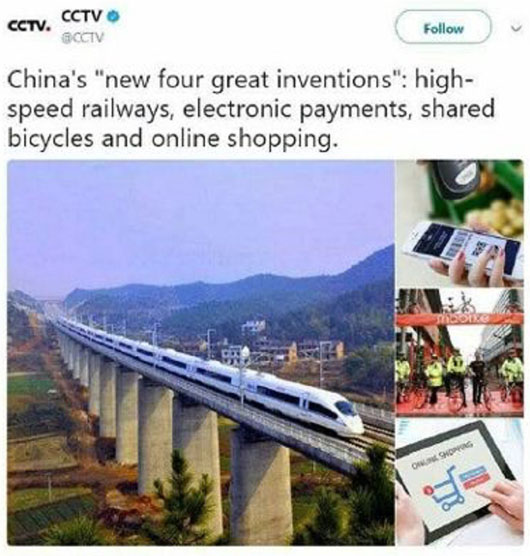by WorldTribune Staff, April 3, 2018
Chinese officials and state-run media have been boasting about how China invented high-speed rail, mobile payment, e-commerce, and bike-sharing.
 In a December 2017 tweet, the Global Times referred to them as “China’s ‘four great new inventions’ in modern times.”
In a December 2017 tweet, the Global Times referred to them as “China’s ‘four great new inventions’ in modern times.”
Most recently, National People’s Congress (NPC) delegate Pony Ma, the chief executive of Internet giant Tencent and China’s richest man, said “We have a new phrase called the ‘new four great inventions’ in China, including high-speed railway, online shopping, mobile payment and sharing bikes.”
Except, all four of the inventions are not China’s. They were invented decades ago, the BBC noted in an April 3 report:
- High-speed rail: According to the Worldwide Rail Organization (UIC), the first high-speed train service began in 1964 – Japan’s Shinkansen or bullet train. China opened its first high-speed rail line in 2008, from Beijing to Tianjin, just ahead of the Olympic Games.
- Mobile payments: Some of the first payments by a mobile device were made in 1997 in Finland. Reports from the time stated that Telecom Finland had enabled a music jukebox and drinks vending machines to be operated by calling a payphone number – including Coca-Cola machines in Helsinki Airport. Some argue that mobile payment technology truly began when Apple Pay made its debut in 2014.
- E-commerce: Englishman Michael Aldrich is credited with inventing the online shopping concept in 1979. Using a technology called Videotex, Aldrich connected an ordinary TV set to the local retailer’s computer via a telephone line. E-commerce became popular when Amazon and eBay launched their websites in 1995.
- Bike-sharing: The “white bicycle plan” was introduced in Amsterdam in the 1960s by the Dutch counterculture movement Provo. The first large-scale bike sharing schemes began in the 1990s in European cities – Copenhagen is credited with introducing the first. Chinese firms like Mobike and Ofo are at the forefront of “dockless” bike-sharing, a new system where users locate bikes with their smartphone, and drop them off anywhere without the need to park them at a specific dock.
So why does China continue to claim the inventions?
“The term ‘four new inventions’ harks back to the ‘four great inventions’ of ancient China – papermaking, gunpowder, printing and the compass,” the BBC noted.
According to the World Economic Forum, China is second to the United States in research and development spending as Beijing seeks to become what it calls an “innovation nation” by 2020.
“After years of subordination to the technological supremacy of developed nations in the West, China has come to realize the importance of developing core technologies on its own. Only by doing so can it truly gain independence and win respect from both partners and competitors,” the state-run Xinhua news agency said.
Xinhua’s article noted that “Among the four, high-speed rail and online shopping aren’t from China, but we bring the inventions to the world’s top level with our intelligence and innovation and make them China’s calling card.”
While the “four new great inventions” may hot have originated in China, Beijing “has outpaced other countries in the widespread adoption and adaptation of all of the four technologies,” the BBC said.
China now has the world’s largest high-speed rail network, about 25,000 kilometers (15,500 miles) – and aims to double it by 2030.
China’s total mobile payments in the first 10 months of 2017 stood at $12.7 trillion, the world’s largest volume, according to China’s Ministry of Industry and Information Technology.
With more than 700 million Internet users, China is also the biggest and fastest growing e-commerce market in the world, according to a 2017 study by PricewaterhouseCoopers.
In February, the vice minister of China’s Ministry of Transport said that there are 400 million registered bike-sharing users and 23 million shared bikes in China.
Subscribe to Geostrategy-Direct __________ Support Free Press Foundation
